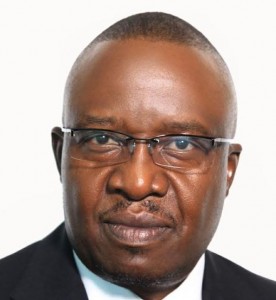Stanbic conference spotlights small business pitfalls

Sejjaaka cautioned SME owners of the dangers associated with lavish spending at the expense of the business growth.
April 6, 2018—Lending to small and medium enterprises (SMEs) was only 48% of the total loans according to latest figures, however the sector makes up 90% of Uganda’s private sector and is the largest employer, yet its contribution to the country’s GDP growth remains marginal.
“There is no inclusive growth in Uganda and the reason why, is that SMEs are not participating because they are on the sidelines,” Patrick Mweheire, the Stanbic Bank Uganda Chief Executive said at the first Stanbic Enterprise Conference held in Kampala.
MTN Uganda, Uganda Breweries Limited and Crown Beverages joined SBU in organising the two-day event that attracted many SME owners and representatives along with exhibitors and several technocrats.
It is also part of Stanbic’s parent, Standard Bank Group’s commitment, to actively participate in transforming Africa and it sees SMEs as crucial drivers in this process. Similar conferences are being held in all the Stanbic 18 operations on the continent.
With the theme, “Building a sustainable Uganda through Business’, Mweheire offered five suggestions that could help to turn around the fortunes of SMEs in Uganda.
Due to its basic importance as an essential input, he said there must be consistent moves by the government to improve infrastructure. Secondly, regulation must be tempered by common sense. Cumbersome procedures or excessive red tape hurt SMEs the most.
Third, owners of SMEs needed to be exposed to human capital that allows them to learn and use better management tools in running their businesses.
For his fourth suggestion, Mweheire spoke of access to markets and developing an environment that encourages the formation of supply linkages. Finally, he said SMEs needed capital, but added: “Don’t expect banks to provide all your debt financing. Learn to use your savings,” Mweheire said.
He said these suggestions come with a practical side, because Stanbic recently opened a business incubator, where the first group of SME owners, are being trained in a wide range of topics tailor-made to help their enterprises become more efficient with the ultimate view of sustaining growth.
Mweheire said Ugandans’ poor culture of saving money also continues to worry with the present rate at 15% of GDP while at least 30% is considered the least acceptable ratio. A higher rate of savings provides a bigger pool of investment funds from which both the public and private sector can tap into.
Samuel Sejjaaka, the keynote speaker and Country Team Leader for Abacus Business School said, Ugandans should refrain from undermining their businesses. Even the most modest enterprise plays a pivotal role in the national economy in terms of taxes, employment and output. “That is why it’s important to run our businesses sustainably. It’s not that our business ideas are poor, but the problem is how to manage them,” he said.
He highlighted resilience as a vital factor towards any success, but failure is no crime, as long as one does not give up.
Being uninformed and not organised, together with making unrealistic plans and a lack of experience, has also contributed towards many failures. Throughout his presentation Sejjaaka gave numerous examples, including personal ones that mapped out the many pitfalls along the way.
Sejjaaka called on SME owners not to only get fully involved in their businesses, but also seek out good advice and not overly depend on the business as the sole source of income because that also limits re-investment in the venture. He cautioned on the dangers of hubris, when owners indulge in lavish spending and living beyond their means while their businesses suffered for lack of new capital. He advised that profits be plowed back.
“That point of take-off is where you should be the most careful, because it will set the path for the failure or success of your business. Take the long term view. There is no such thing as overnight success. Learn the science of business and be active in the business, because the buck stops with you. Don’t blame others for your own mistakes,” he said.
Summing up, Sejjaaka said continuity is part and parcel of sustainable business. “Identify people in your family who have the characteristics to take the business forward. But they must make their own mistakes. Have them go through an apprenticeship,” he said.
He said there are three basic factors that he has seen in all successful business people namely resilience and the patience to invest in seeing their enterprises grow, a sense of humility and being trustworthy.

 African Heads of state head to South Korea next week for Summit talks
African Heads of state head to South Korea next week for Summit talks
 Trading leads as main source of income for Ugandans
Trading leads as main source of income for Ugandans
 New leadership for bankers’ umbrella as total assets top $12 billion
New leadership for bankers’ umbrella as total assets top $12 billion
 Brussels Airlines to announce Nairobi service
Brussels Airlines to announce Nairobi service
 SITA promises enhanced travel experience after Materna acquisition
SITA promises enhanced travel experience after Materna acquisition
 Saudia’s 105 aircraft order stretches A320neo lead over rival Max
Saudia’s 105 aircraft order stretches A320neo lead over rival Max
